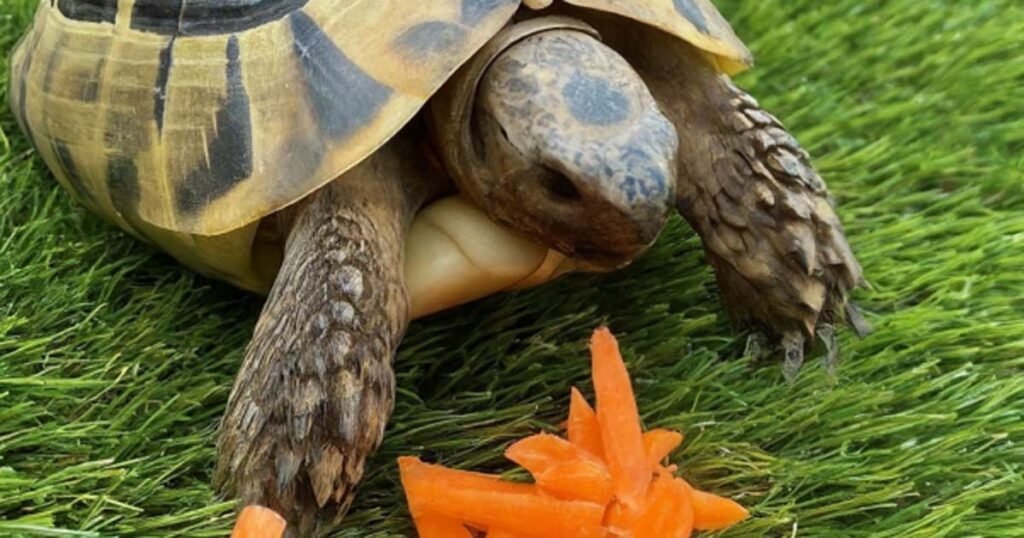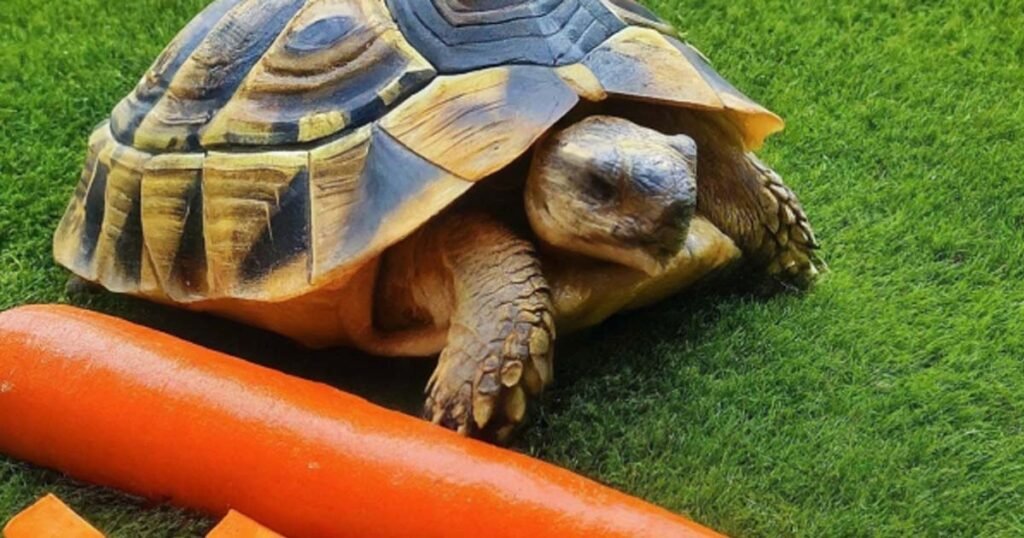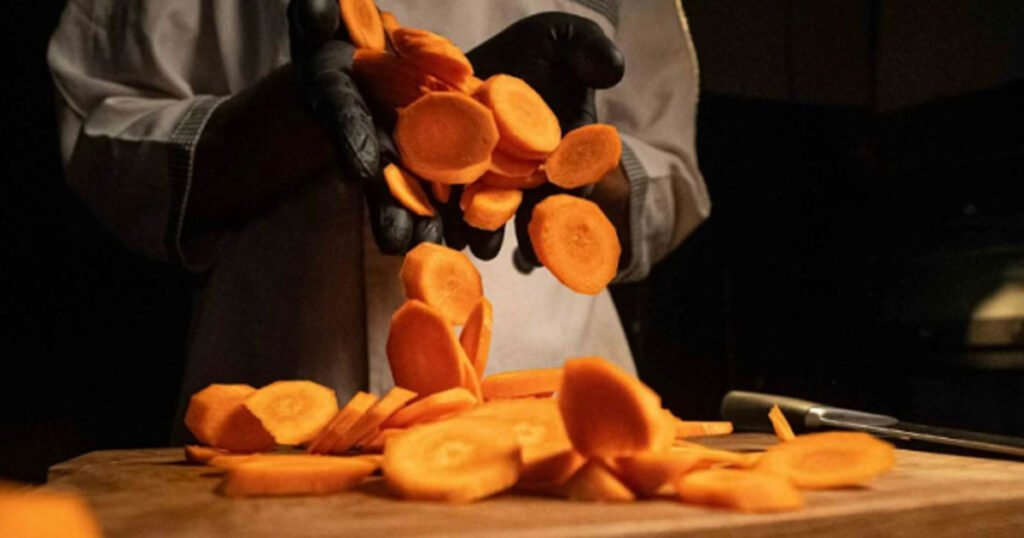Curious about your pet’s diet, and whether Can turtles eat carrots? These crunchy delights are often included for their health benefits, but are they safe for turtles? Whether you have an aquatic turtle, a terrestrial tortoise, or an amiable terrapin, figuring out their dietary needs is crucial. While turtles primarily eat insects, they also eat meat, and fruit and vegetation are encouraged for a balanced diet.
You might find that some tortoises love carrots, and others don’t. While carrots offer essential nutrients, it’s essential to understand the right balance to ensure your shelled friend stays healthy. Join us on this nutritional adventure as we explore whether can turtles eat carrots. And the dos and don’ts of introducing carrots to your turtle’s menu.
Table of Contents
Can Turtles Eat Carrots?

Yes, turtles can eat carrots. These vibrant vegetables are generally safe for turtles. Carrots can be offered as occasional treats or added in small quantities as part of their main meal. The whole carrot, including the top and flowers, is edible and can benefit pet turtles.
It’s crucial to remember that the ideal diet for most turtle species includes plant nutrients. You can supplement their diet with carrots. To ensure a well-rounded and healthy diet for turtles, carrots should be treated as a special treat rather than a regular occurrence.
Carrots Nutrition Chart: What Nutrition Turtle Get?
This table provides a clear and organized breakdown of the nutritional content of mature and baby carrots, making it easy to compare the two.
| Nutrient | Mature Carrots (per 100g) | Baby Carrots (per 100g) |
| Water | 87.7g | 89.3g |
| Carbohydrates | 10.3g | 9.08g |
| Fat | 0.35g | 0.14g |
| Protein | 0.94g | 0.8g |
| Fiber | 3.1g | | 2.7g |
| Phosphorus | 40mg | 30mg |
| Calcium | 30mg | 42mg |
How Turtles Health Benefit From Carrots
Pet turtle nutritional requirements can vary significantly based on several factors such as species, age, and habitat. Carrots are considered safe for most turtles, provided they are fed in proper quantities.
Carrots as Nutrient-Rich Treats
Carrots boast nutritional benefits for turtles. They are rich in vitamins and minerals, including vitamin A, calcium, phosphorus, fiber, and more. However, it’s important to consume carrots in moderation. Excessive consumption of any fruity food, including carrots, can lead to health issues such as obesity and digestive problems in turtles.
Vitamin A and Its Importance
Carrots are renowned for their high vitamin A content. Vitamin A is crucial for turtle development, vision, reproduction, and the immune system. However, the effectiveness of beta-carotene, the form of vitamin A present in carrots, can vary based on turtle species. Carrots generally have one of the highest vitamin A concentrations among fruits and vegetables.
Calcium and Phosphorus Balance
Calcium and phosphorus are vital nutrients for turtle skeleton (bones), carapace development, and overall health. Adequate calcium intake prevents issues like soft and rubbery shells, shell pyramiding, and lumps on the turtle’s head. Achieving the right balance between calcium and phosphorus is crucial to maintaining healthy bone structure and muscle activity.
Fiber for Digestive Health
Carrots contribute a good amount of fiber to a turtle’s diet, promoting proper gut (digestive) function. Fiber aids in maintaining a healthy digestive system, supporting regular bowel movements and overall gastrointestinal well-being.
Protein for Vital Functions:
Carrots contribute to turtle protein intake, essential for various bodily functions. Proteins support the development of muscles, tissues, and enzymes, playing a crucial role in overall health and vitality.
Calorie-Balance
Carrots offer an added benefit with their low-calorie content, making them a healthy choice for your pet turtle’s diet. Low-calorie foods play a crucial role in preventing health issues like weight gain, particularly when coupled with an active lifestyle. This ensures your turtle maintains a balanced weight, promoting overall well-being.
The Drawbacks of Carrots in a Turtle’s Diet

Carrots, while seemingly beneficial, come with a set of nutritional risks that reduce their role in a turtle’s diet.
Calcium-to-Phosphorus Ratio: A Critical Imbalance
Carrots have a significant calcium-to-phosphorus ratio. Unfortunately, this ratio is not ideal for turtles, as phosphorus levels tend to surpass calcium. In a turtle’s body, calcium and phosphorus naturally stick together. If the food contains more phosphorus than calcium, the turtle’s body reacts by releasing calcium, primarily stored in bones, to restore balance.
Surprisingly, the calcium-to-phosphorus ratio is better in baby carrots than in mature ones. However, it still falls short of the optimal ratio for turtles. This should ideally be around 1.5:1 or 2:1, where calcium should be twice as high as phosphorus.
Sugar Content: A Cause for Concern
Another nutritional concern associated with carrots is their moderate sugar content. While natural sugars are part of many fruits and vegetables, the sugar levels in carrots make them less suitable as a major component of a turtle’s diet. Excessive sugar consumption can lead to health issues for various pet turtle species.
Oxalates: Blocks Calcium Absorption
Carrots are rich in oxalates, another challenge for turtle health. Oxalates (comes from oxalic acid) are found in large amounts in carrots. This can bind to calcium within the body, blocking its absorption. This interference deprives turtles of essential calcium from their diet. In large quantities, oxalates may contribute to additional health problems if not monitored.
Considering these nutritional downsides, carrots should only be offered to herbivorous or omnivorous turtles in moderation. The importance of moderation cannot be stressed enough to maintain a balanced diet for your pet. Consulting a veterinarian before introducing new food items is always the best step.
How To Feed Carrots To Your Turtle?

Feeding Raw Delights: Turtles can relish carrots’ raw goodness, including the tops and flowers. It’s a wholesome treat that adds variety to their diet. As a golden rule, always provide fresh produce (organic).
Thorough Washing: Give the carrots a good wash under clean, running water. This helps remove any dirt, pesticides, or contaminants present on the surface.
Slice and Serve: Preparing carrots for your turtle is a breeze. Chop them into slices, offering a small amount at first. Turtles, with their distinct preferences, may respond differently.
Observing Preferences: Turtles, like any pet, have individual tastes. Pay attention to your turtle’s response to carrots. If your shelled friend eagerly consumes them, great! If not, it’s not a cause for concern. Try different fruits and vegetables to ensure a diverse and balanced intake of nutrients.
Carrot Skin and Tops: Are These Parts Safe For Turtles
Carrot skin is safe for turtle consumption. It provides fiber content. While carrots aren’t a primary source of fiber for turtles, the skin adds a nutritional boost to digestive health.
Surprisingly, carrot tops are considered healthier than the main part, containing less sugar. Including both skin and tops in your turtle’s diet offers a variety of textures and flavors, enriching its dining experience. Notice your turtle’s preference and it will help you provide a well-rounded diet, so it gets the nutrients it needs.
FAQ
Can box turtles eat carrots?
Yes! Box turtles can munch on carrots without worries. These vibrant veggies bring a boost of essential vitamins, particularly vitamin A, vital for maintaining healthy eyesight. So, go ahead and treat your box turtle to some crunchy carrot goodness!
Can eastern box turtles eat carrots?
Eastern box turtles share similar dietary preferences with their box turtle counterparts. So yes – eastern box turtles can indeed enjoy carrot crunch. You can add this colorful veggie to their diet to make sure they get all the vitamins and minerals they need.
Can painted turtles eat carrots?
Painted turtles can enjoy chewing on carrots as part of a healthy diet that includes various veggies. When it comes to offering carrots to your painted turtle pals, choosing baby carrots is the best choice.
Can red-eared slider turtles eat carrots?
Red-eared slider turtles can also eat carrots, including both the vibrant orange part and the green top. So, feel free to mix baby carrots into their diet for a colorful and nutritious treat that your painted turtles will surely appreciate!
Read More: What To Feed Snapping Turtles
Conclusion
So, can turtles eat carrots? Definitely! These vibrant veggies can be a delightful addition to your shelled friend’s diet, providing a burst of nutrition and satisfying crunch. Packed with vitamin A, fiber, and other essential nutrients, carrots offer a healthy treat for your aquatic or land-dwelling companion.
However, the golden rule is to be moderate. While carrots bring nutritional benefits to the table, overeating can pose risks due to factors like sugar content and less-than-ideal calcium-to-phosphorus ratios. Strike the right balance, chop them into turtle-friendly portions, and let your pet nibble away.
